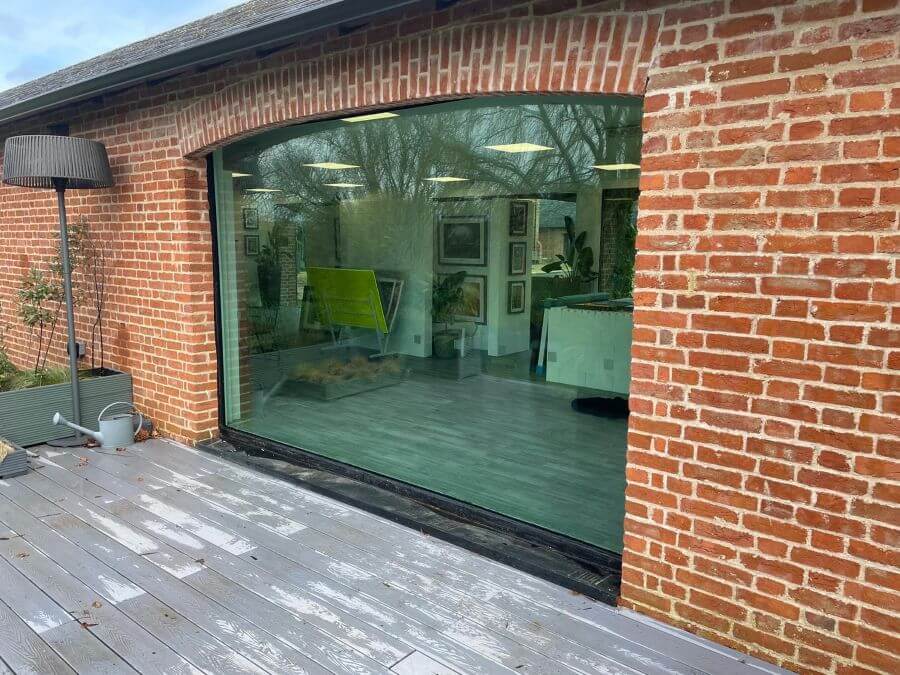Commercial vs. residential windows: Key differences explained
- 26 February 2025
- Help and Advice

Windows are a crucial element in both residential and commercial buildings, providing natural light, ventilation, and insulation. While they may seem similar at first glance, commercial and residential windows are designed for entirely different purposes, requiring distinct materials, installation methods, and durability standards. In this guide, we explore the fundamental differences to help property owners choose the right solution for their needs.
What sets commercial and residential windows apart?
The primary distinction between commercial and residential windows lies in their construction and intended use. Residential windows are built for homes, prioritising aesthetics, comfort, and energy efficiency. In contrast, commercial windows must withstand greater structural loads, accommodate larger spaces, and meet stricter safety regulations.
Understanding these differences is essential for property owners looking to make informed decisions about window installation, whether for a cosy home or a large-scale commercial building.
Materials: Choosing the right glass and frames
Residential glass vs. commercial glass
Residential glass windows are designed for smaller spaces and typically feature thinner glass material with uPVC or timber framing. This setup offers a balance of insulation, aesthetics, and affordability. Homeowners prefer glass materials that contribute to a cosy home atmosphere while keeping energy bills in check.
Commercial glass windows, on the other hand, require stronger materials to withstand high winds, structural loads, and larger business spaces. These windows often use tougher materials like tempered or laminated glass, designed to improve durability and safety for various construction projects. Additionally, commercial shopfront glass must meet stringent building regulations, particularly for retail outlets and office partitions.
Framing differences
Residential windows commonly use uPVC or timber frames due to their affordability and insulation properties. uPVC framing is especially popular in residential buildings for its low maintenance and energy efficiency.
In contrast, commercial window frames are typically made from aluminium or steel, providing additional strength and durability. These materials support the weight of larger glass panels, such as curtain walls, often found in commercial settings.
Aluminium windows for homes: A modern and durable choice
While aluminium is commonly associated with commercial glazing, it is also an excellent choice for homeowners seeking durability and a sleek, modern aesthetic. Aluminium windows offer a slim frame profile, allowing for larger glass panels that maximise natural light without compromising strength. Unlike timber, aluminium does not warp or rot, making it a long-lasting and low-maintenance option.
At SGC Glass, we fabricate high-quality aluminium windows tailored to both residential and commercial properties. Our aluminium window solutions provide excellent thermal efficiency, security, and weather resistance, making them a practical investment for homeowners who want a contemporary look with lasting performance.

Size and design: Simpler vs. structural requirements
Home windows vs. commercial shopfront windows
Residential windows are generally smaller and designed for specific areas like bedrooms, kitchens, and living rooms. They often feature simpler designs with less glass and more panelling to complement home aesthetics.
Commercial window installation, however, demands custom solutions for larger business spaces. Shopfront windows, for example, maximise natural light while offering durability against external elements. Geometric designs and structural reinforcements are common in commercial properties, especially in high-rise buildings.
Specialised glass and coatings
Commercial glass materials often include specialised glazing treatments to improve insulation, reduce glare, and protect against UV exposure. This is particularly important in commercial spaces where plate glass items like glass doors and office partitions are common.
Residential glass windows, while also available with coatings for insulation, generally do not require the same level of durability and resistance to environmental stressors.
Energy efficiency and insulation
Reducing energy costs
Energy efficiency plays a crucial role in both residential and commercial window selection. However, the needs vary significantly. Residential windows focus on insulation to maintain body heat and reduce reliance on heating and cooling systems, ultimately lowering energy bills.
Commercial windows, designed for larger spaces, must address different environments with higher thermal performance. Cooling systems in commercial buildings must work harder, requiring windows with additional strength and insulation properties.
The role of glass thickness
Homeowners may opt for double glazing to improve insulation, whereas commercial window glass often comes in triple glazing or laminated options. This helps manage temperature fluctuations in commercial settings and reduces noise pollution.

Installation process: Complexity and safety considerations
How does commercial window installation differ from residential?
Installing commercial windows is a far more complex process than fitting residential glass. Commercial buildings require scissor lifts, cranes, and specialised equipment due to the sheer size and weight of the glass panels. Additionally, commercial window installation must adhere to strict safety regulations, ensuring structural stability in high-traffic commercial properties.
In contrast, residential window installation is more straightforward, requiring fewer specialised tools and taking less time to complete.
Cost considerations: Investment vs. affordability
Higher cost of commercial glass
Due to the need for tougher materials, larger sizes, and more complex installations, commercial windows tend to be more expensive than residential windows. Property owners should consider not just the upfront cost but also long-term savings in energy efficiency and maintenance.
Affordability of residential windows
Residential windows are typically more budget-friendly, making them a practical choice for homeowners. With the right materials and installation, they provide excellent insulation and durability without the major spike in costs associated with commercial glass windows.

Commercial vs. residential windows: Which is right for your property?
Choosing between residential and commercial windows installation depends on several factors,, including property type, location, and performance requirements. Homeowners seeking a perfect fit for their living spaces should prioritise energy efficiency and aesthetics, while business owners must focus on durability and compliance with commercial building standards.
SGC Glass offers high-quality commercial glass solutions tailored to business needs in London, Essex, and the surrounding areas. Whether you require commercial window installation, shopfront glass, office partitions, or glass doors, our expert team provides professional installation with quality materials and outstanding craftsmanship.
Contact SGC Glass for expert advice
Looking for reliable commercial window installation? Our experienced team at SGC Glass can guide you through the entire project, ensuring the right materials and installation process for your commercial spaces. Contact us today to discuss your glazing needs and discover the best window solutions for your property.











